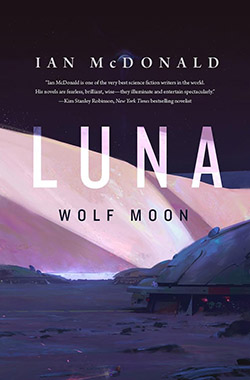In this ongoing series, we ask SF/F authors to describe a specialty in their lives that has nothing (or very little) to do with writing. Join us as we discover what draws authors to their various hobbies, how they fit into their daily lives, and how and they inform the author’s literary identity!
As I write this, the control box has just given us the fifteen minute call. The rest I wrote earlier today; these lines I left until now, for immediacy. I have to go and talk to my cast. Nerves must be settled, egos massaged, quirks and querulousness calmed and general encouragements dispensed.
I’m directing an amateur production of Jessica Swales’s Blue Stockings. We’re entered in Bangor Festival, one of eight plays competing for glitz and glory and places in the Northern Ireland and All-Ireland Finals. In Ireland, amateur drama festivals are a Thing. The All-Ireland makes the news in Dublin. There are daily reports on RTE Radio. Standards are vertiginously high. Competition is Darwinian. To paraphrase the late, great football manager Bill Shankley: “Amateur drama isn’t a matter of life and death; it’s much more important than that.”
This will be our fifth performance out of six. We build set, light, and perform a complete show all in one day. We’ve been rehearsing since November 2016—three nights a week—and this is my second directing role for our group, based in North Belfast. I like big shows, and I like plays that deal with issues: Blue Stockings does both. It’s the story of the class of 1896 at Girton College in Cambridge—the then-all-women’s college—at a time when women couldn’t graduate from Cambridge University. I’ve got a cast of nineteen, ranging in age from 16 to I-dare-not-say, and in experience from seasoned thesps and semi-professionals to complete novices stepping out under the lights for the first time. I have a crew of four, two tech and a Stage Manager, Production Manager, Music Director, Choreographer, a Fight Arranger and an informal Assistant Director.
You wonder where I find the time to write.
So do I.
I’ve been involved in the world of amateur drama for twelve years now. Sometimes performing (though I don’t enjoy it very much because I hate dressing up in costumes), sometimes lighting or designing video, sometimes just shifting carrying and building, mostly cheering.
It’s the opposite of the writing life: co-operative, collaborative. I’m a very private writer—the thought of beta readers horrifies me. Dramatics is different. We don’t do auteur theory. Your degree of control is very small. You compromise and adapt on the fly. You expose and conceal yourself as you do in writing, but in different ways. Your work is ephemeral. Each performance is unique and one-off. Books are set, unchanging. Plays are moments: a night, a shared emotion, a communion between performers and crew, and that and audience. So much work, for a couple of hours that will never be repeated again.
I believe there are exchangeable skills between acting and writing. They lie in the relationship between life and page. As a writer, I take life and fight it down on to a page. I make it small but vital; concise but rich. I strip humanity back to simple descriptors and dialogue. An actor does that in reverse: takes the page and turns it into life: into embodiment, into physicality: from the realm of the timeless to the timebound. These unchanging words, spoken and expressed in this moment. Words written perhaps four hundred years ago, filled with breath and life in 2016.
Two—if we rank well, three—shows and we’re done with the festival play. There’ll be a bacchanale of a wrap party at our place, then on to the next project, our low-comedy summer theatre, which we take up for four days to a seaside resort on the north coast, and which bankrolls the rest of the year. One acts, readings, and the painted ponies will go round and round again to next year’s Festival Play. I won’t be directing. Honest. It’ll take twelve months to recover from this one. And I’ve got books to write. But tonight, we put on make-up. We dress up right. We light the lights. And for a couple of hours, we work a particular, intimate, unrepeatable magic.
Top image: Muppet Vision Theater in Walt Disney World
 Ian McDonald was born in 1960 in Manchester, England, to an Irish mother and a Scottish father. He moved with his family to Northern Ireland in 1965. Ian McDonald is the renowned science fiction writer behind River of Gods and the Everness sequence. His most recent book, Luna: Wolf Moon, is now available from Tor Books. He has won the Locus Award for Best First Novel, the British Science Fiction Association Award for Best Novel, the John W. Campbell Memorial Award for Best Novel, and the Hugo Award for Best Novelette. He now lives in Belfast. He is on twitter as @iannmcdonald.
Ian McDonald was born in 1960 in Manchester, England, to an Irish mother and a Scottish father. He moved with his family to Northern Ireland in 1965. Ian McDonald is the renowned science fiction writer behind River of Gods and the Everness sequence. His most recent book, Luna: Wolf Moon, is now available from Tor Books. He has won the Locus Award for Best First Novel, the British Science Fiction Association Award for Best Novel, the John W. Campbell Memorial Award for Best Novel, and the Hugo Award for Best Novelette. He now lives in Belfast. He is on twitter as @iannmcdonald.









